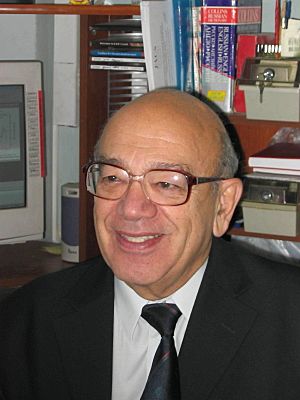Ilya Moiseev facts for kids
Quick facts for kids
Ilya Iosifovich Moiseev
|
|
|---|---|
| Илья Иосифович Моисеев | |
 |
|
| Born | 15 March 1929 Moscow, USSR
|
| Died | 11 October 2020 (aged 91) Moscow, Russia
|
| Citizenship | USSR, Russia |
| Education | MITHT (1952; PhD 1967) |
| Known for | metal-complex catalysis |
| Awards | Centenary Prize (2006) Demidov Prize (2012) Chugaev Prize (2012) Mendeleev Medal (2013) |
| Scientific career | |
| Fields | chemistry |
| Institutions | IGIC RAS (1963-) RGUNG Gubkin (2003-) |
| Thesis | Research in the field of chemistry of π-complexes of palladium (1967) |
Ilya Iosifovich Moiseev (Russian: Илья Иосифович Моисеев) was a Russian chemist. He was born on March 15, 1929, and passed away on October 11, 2020. He was an expert in how chemicals react and how metals combine with other substances. He made big advancements in using metal compounds to speed up chemical reactions, a process called metal-complex catalysis.
Life and Education
Ilya Moiseev was born in Moscow, which was then part of the USSR. He went to the Moscow State University of Fine Chemical Technologies (MITHT). There, he studied organic chemistry, which is the study of carbon-based compounds.
After he finished his studies in 1952, he started his career. He worked as an engineer and then as a researcher. In 1963, he began working at the N. S. Kurnakov Institute. This institute is part of the Russian Academy of Sciences (RAS) in Moscow. At the institute, he became the head of a special laboratory. This lab focused on metal-complex catalysis and coordination chemistry. Later, from 2003, he also became a professor at the Gubkin Russian State University of Oil and Gas.
Moiseev also held important roles outside his main work. He was the chairman of the Scientific Council for Gas Chemistry at the RAS. He also served as the vice-president of the Russian Chemical Society.
Key Discoveries and Research
Ilya Moiseev developed new ideas for creating catalysts. Catalysts are substances that speed up chemical reactions without being used up themselves. His new catalysts were very effective. They helped make important chemical compounds from cheap materials like hydrocarbons. Hydrocarbons are found in oil and natural gas.
Moiseev cared about both saving money and protecting the environment. His inventions led to industrial methods for making several important chemicals:
- Acetaldehyde from ethylene.
- Formic acid from carbon monoxide and water.
- Hydrogen peroxide from oxygen.
- Isoprene.
He also discovered special Palladium catalysts. These catalysts work very well even under gentle conditions. He also created new types of inorganic compounds.
Moiseev's Reaction
Perhaps his most famous discovery was in 1960. He found a way to make vinyl acetate from ethylene. This reaction used a Palladium catalyst. This discovery became known as Moiseev's reaction. For the reaction to work, sodium acetate must be present. Moiseev also used a substance called benzoquinone. This helped the Palladium catalyst to be used again and again.
Awards and Recognition
Ilya Moiseev received many important awards for his work. In 2002, he was given the State Prize of the Russian Federation. This is a very high honor in science and technology. In 2011, he received another award from the Government of the Russian Federation for his work in science and technology.
He also received several orders, which are special honors from the government:
- The Order of the Red Banner of Labor (1986)
- The Order of Honor (1999)
- The Order of Friendship (2009)
International organizations also recognized his contributions:
- The Royal Society of Chemistry gave him the Centenary Prize in 2006/7.
- In 2012, he received the Demidov Prize. This was for his work on compounds that contain both organic and metal parts, and his work in petrochemistry.
- Also in 2012, he was awarded the RAS Chugaev Prize. This was for his work on coordination compounds in important industrial reactions.
- In 2013, he received the RAS Mendeleev Medal. This was for his excellent work in catalysis and energy-saving technologies.
Moiseev became a corresponding member of the Academy of Sciences of the USSR in 1990. He then became a full member, an academician, of the Russian Academy of Sciences in 1992. He was also a full member of several other important academies around the world. These included the Academy of Sciences, Arts and Literature in Paris, the European Academy of Sciences and Arts, and the Academia Europaea.

